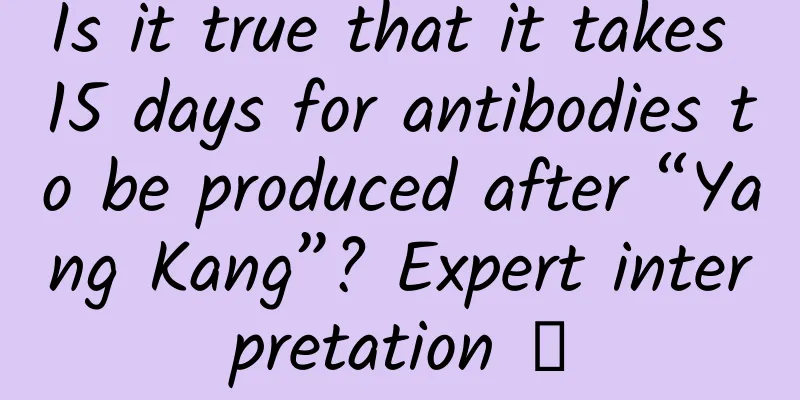Is it true that it takes 15 days for antibodies to be produced after “Yang Kang”? Expert interpretation →

|
If the antigen turns negative and then turns positive again, does it mean that it is not completely cured? What is the difference between "re-positive" and "secondary infection"? It is said online that it takes 15 days for antibodies to be produced after "positive health". Is this true? Li Dongzeng, chief physician of the Department of Infection, Beijing You'an Hospital, interprets the issues of concern to netizens. 01 What is the difference between “re-positivity” and “secondary infection”? "Fuyang" means that the symptoms of the infected person have basically disappeared, and the nucleic acid test and antigen test are negative, but then the test is positive again. It is generally believed that what is detected at this time are some fragments of the virus, not the complete virus, with no symptoms and infectiousness, and no impact on normal life. "Secondary infection" means that the person has completely recovered from the COVID-19 infection, but is infected with the coronavirus for the second time. Secondary infection usually causes symptoms, and the Ct value of the nucleic acid is relatively low, the viral load is high, and it is contagious. Experts say that the probability of "re-infection" and "secondary infection" in people with normal immune function is very low. Generally, patients with normal immune function can obtain protection for more than 3 to 6 months after recovery from infection , and the probability of "secondary infection" during this period is very low. 02 Which groups of people experience "re-testing" and "secondary infection" More likely? Experts gave relevant information on which groups are more likely to suffer from "secondary infection". People with low immune function , such as the elderly and infants under three years old. The immune function of the elderly has deteriorated, and the protection of the patients after recovery is relatively short-lived; the immune function of infants under three years old is not yet fully developed, and the protection they gain after recovery may also be relatively short-lived. For people with immunodeficiency , such as AIDS patients and users of immunosuppressants, their protection lasts for a relatively short period of time, and as time goes on, the risk of "secondary infection" is relatively high. People in high-risk positions , such as medical staff and public transportation operators, usually have more contact with people and are at higher risk of infection. There is no special pattern for "re-positivity" so far. It is just an indicator of detecting virus fragments and has little to do with physical differences . 03 A person may have different strains of the virus And multiple infections occur? In addition, experts say that a person may be infected multiple times due to different strains . According to relevant reports from abroad, there are many people who have been infected twice, fewer who have been infected three times, and it is very rare to be infected four or five times. Because we can obtain certain antibody protection every time we are infected, the risk of reinfection will be reduced, and the symptoms after reinfection will also be alleviated. 04 Is it easy to get infected within two weeks after “Yang Kang”? It is said online that "it takes about two weeks for antibodies to be produced after a positive test, so a second infection is most likely during this period." Experts responded that it is not true that it is easy to be infected within two weeks . The specific antibodies we often talk about take two weeks to reach a relatively high level. But in fact, the moment the virus enters the human body, the immune system has already started working. The protective antibodies produced subsequently will reach a peak in two to three weeks and last longer, but it does not mean that the human body has no protection within these two weeks. At this time, if the virus enters the body again, it can be cleared quickly, and it is relatively difficult to be infected. In general, the longer the time after infection, the lower the antibody level in the body, and the greater the risk of infection . 05 How long after testing positive can I get a booster shot? How long after recovery can you get a booster shot? According to experts, after recovery, the protection generally lasts for 3 to 6 months. Young people can get a booster shot after 6 months. The elderly can get a booster shot after 3 months because their protection is shorter . Source: CCTV News The cover image of this article is from the copyright library and is not authorized for reproduction |
<<: Canalys: India's smartphone shipments to reach 38.9 million units in Q4 2023
Recommend
What should women pay attention to when losing weight and maintaining health?
Losing weight is a topic that female friends have...
Can you drink osmanthus tea during menstruation?
Osmanthus tea is a kind of tea that many people l...
Increased secretion is like water discharge
Increased secretions, like watery discharge, are ...
What should women do when they have stomach pain during menstruation?
We all know that healthy women have a menstrual c...
Is it normal to delay your period by 2 days?
Menstruation is a normal physiological phenomenon...
Is it good to use PE line for wild fishing? How to see if there are fish when fishing in the wild?
PE line is not unsuitable for wild fishing, but i...
What is the reason for missing menstruation?
Menstruation is a stage that every woman needs to...
If you eat tomatoes properly, losing a pound a day is not a problem!
Tomatoes are a very common fruit and vegetable in...
Holding your urine can not only land you in the hospital, but it can also be life-threatening! Be careful on your return trip…
Expert of this article: Li Tian, Chief Physicia...
What is severe hair loss in women?
Hair loss is a problem that troubles many people,...
Ovulation period beggars conception
For those friends who are working hard on the roa...
What are the symptoms of nipple pain at the age of 46?
Many female friends have experienced breast pain ...
Bleeding after taking birth control pills
Some female friends may experience bleeding after...
A family of three was diagnosed with cancer at the same time. Doctor: The incidence rate is increasing year by year
On February 26, the topic #A family of three suff...









